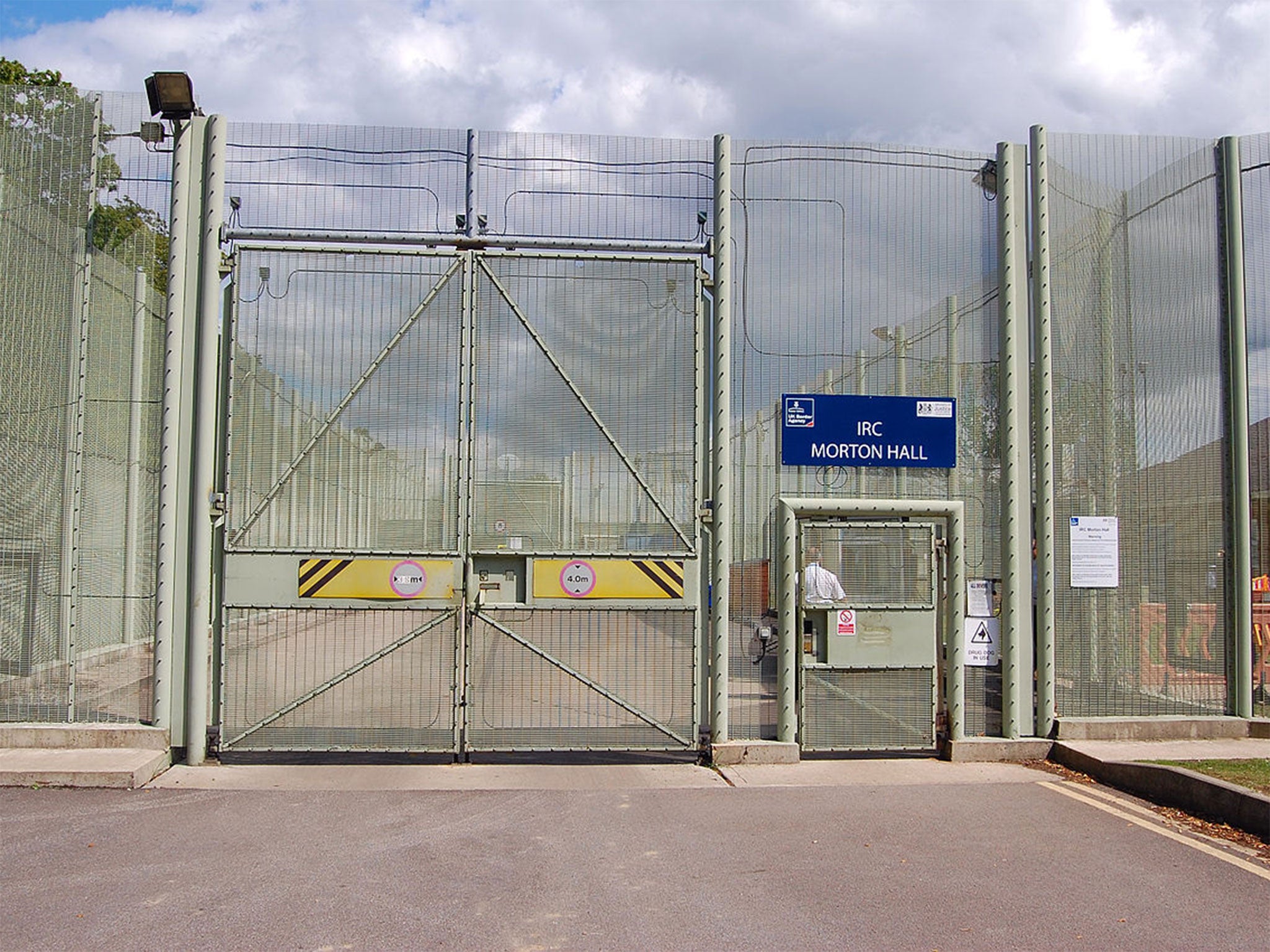Surge in self-harm at immigration removal centre with dozens of ‘vulnerable’ detainees, finds report
Incidents of self-harm at Morton Hall removal centre up 20 per cent in a year despite drop in population

Your support helps us to tell the story
From reproductive rights to climate change to Big Tech, The Independent is on the ground when the story is developing. Whether it's investigating the financials of Elon Musk's pro-Trump PAC or producing our latest documentary, 'The A Word', which shines a light on the American women fighting for reproductive rights, we know how important it is to parse out the facts from the messaging.
At such a critical moment in US history, we need reporters on the ground. Your donation allows us to keep sending journalists to speak to both sides of the story.
The Independent is trusted by Americans across the entire political spectrum. And unlike many other quality news outlets, we choose not to lock Americans out of our reporting and analysis with paywalls. We believe quality journalism should be available to everyone, paid for by those who can afford it.
Your support makes all the difference.There has been a surge in self-harm incidents at an immigration removal centre where dozens of people are detained despite being identified as vulnerable individuals, a new report shows.
Inspectors found they had increased from 181 in 2017 to 217 in 2018, despite the population falling from 376 to 293 over the same period at Morton Hall removal centre, according to the Independent Monitoring Board (IMB).
This means it has risen from 48 incidents per 100 detainees to 74 per 100.
Inspectors also found that at any one time during 2018, there was an average of 42 detainees at the centre who had professional evidence identifying them as “adults at risk”.
This means they had vulnerabilities such as mental health conditions, serious physical disabilities or were a victim of torture or violence.
Politicians and charities said the rise in self-harm highlighted that the use of detention was "inhumane, expensive and unnecessary", too often harming the mental health of those locked up.
They called for the measure to be used only as an "absolute last resort".
Malcolm Brock, chair of the IMB at Morton Hall, said that while there had been improvements in the conditions for men at centre, the board remained concerned about the suitability of a detention environment for some detainees.
“The increase in incidents of self-harm is a matter of definite concern and is indicative of the difficulties that an uncertain and indefinite length of time in detention presents for the wellbeing of some detainees,” he said.
The findings come after a ground-breaking report by the Labour Exploitation Advisory Group (LEAG) found that the Home Office had knowingly held victims of modern slavery in removal centres, in what experts said was a breach of the law.
The department has also been criticised for taking a “careless and cavalier” approach to immigration detention, with campaigners citing casework failures, insufficient judicial safeguards and a general lack of humanity in the system.
Last month, former Tory cabinet ministers attacked the Home Office over its refusal to introduce a time limit on immigration detention.
Former Brexit secretary David Davis said at the time that the absence of a time limit was “clearly perverse”. Former attorney-general Dominic Grieve added that failing to implement a time limit was “leading to injustice”.
Britain is currently the only European Union country without a statutory time limit for the detention of migrants and it has one of the largest immigration detention systems on the continent. Between 1,800 and 3,500 people have been held in removal centres at any given time in the past decade.
Liberal Democrat Christine Jardine said it was “appalling” that the government was still locking up torture victims and other vulnerable people in immigration detention centres, adding: “The shocking rise in self-harm at Morton Hall shows just how harmful indefinite detention is, both mentally and physically.
“Detention must be reduced to an absolute last resort and replaced with community-based alternatives that are more cost-effective and far less damaging to people’s health," she said.
She added: "Locking people up indefinitely is inhumane, expensive and unnecessary.”
Pierre Makhlouf, assistant director at Bail for Immigration Detainees (BID), said: "People are often held in circumstances when their detention is unnecessary and they are kept in prison-like conditions with the uncertainty of how long they will be held or what is to eventually happen to them.
"It is no wonder therefore that the report reflects our criticisms that the use of detention itself causes acts of self harm and that the environment [of immigration removal centres] is harmful to mental health."
James Wilson, acting director of Detention Action, said: “This is the latest in a string of reports this year highlighting significant problems with the UK’s system of indefinite detention. This government must now start to engage meaningfully with urgent calls for a 28 day time limit coming from within the Conservative Party, as well as across Parliament and civil society.”
A Home Office spokesperson said: “Immigration detention is an important part of the wider immigration system, and we are committed to using detention sparingly and only when necessary. We have made significant improvements recently and are committed to doing more and introducing further alternatives to detention, increasing transparency and improving the support available for vulnerable detainees.”
They also said an internal review was commissioned of how time limits work in other countries and how they relate to any other protections within the detention systems in these countries, but provided no additional information or time frame for this.
Join our commenting forum
Join thought-provoking conversations, follow other Independent readers and see their replies
Comments